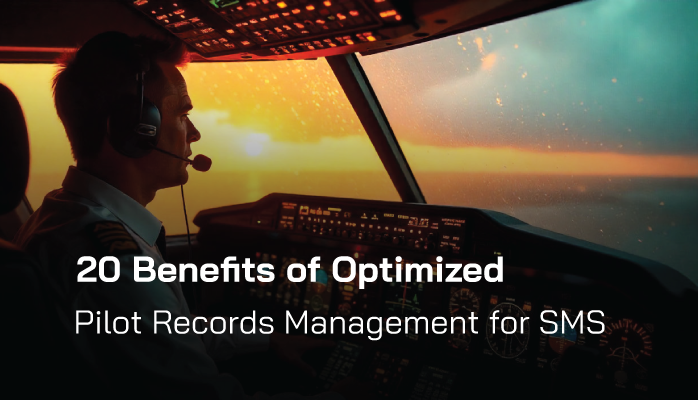What Is Optimized Pilot Records Management

Aviation service providers are well aware of the importance of tracking pilots’ records and documents.
At any given time, an aviation service provider may have dozens of records that require action. Especially when these records are being documented in something like an Excel spreadsheet.
Sound familiar?
Managing all of these records can:
- Be time intensive;
- Have regulatory implications, such as fines;
- Be very hard to task manage and organize; and
- Cause major headaches, especially when required records fall through the cracks.
Optimized pilot records management is how you automate as much record keeping as possible. It includes:
- Tracking records management through an aviation SMS database;
- Having automated notifications for upcoming record-keeping deadlines;
- Being able to organize records based on their type, such as compliance, PRIA, regulatory, background, etc.; and
- Being able to easily search, browse, and retrieve records in a matter of seconds.
Optimized records management can be used for more than just pilots, but for most aviation service providers pilots will require a bulk of the work. Here are the 20 benefits of using optimized pilot record-keeping management.
Regulatory Benefits of Optimized Pilot Records Management
Pilots have many regulatory documentation requirements that you need to track via record keeping. Non-performance on record keeping can result in fines and audits.
Here are the regulatory benefits of pilot records management:
- Reduced risk of pilot fines;
- Significantly reduced risk of regulatory fines related to records;
- Much better audit trails; and
- Flag certain records as being compliance and PRIA related in order to task manage important records.
Cost-Efficiency Benefits of Optimized Records Management

One of the major concerns for managing complex record keeping is the number of manpower resources required to manage it. It can suck up many hours and financial resources that are valuable and better spent elsewhere.
The efficiency you gain from optimized pilot record-keeping can be significant. Here’s why:
- Significantly reduced time and effort tracking down records;
- Significantly reduced time organizing records;
- Significantly reduced time trying to keep track of what is needed and when it’s needed;
- Minimized cost of legal discovery; and
- Integrate pilots’ records management with existing SMS database.
Task Management Benefits of Optimized Pilot Records Management
Trying to manage many records for pilots can be extremely challenging, both logistically and organizationally. How are you going to track all of the records in a timely manner? Who is in charge of this work?
Task management is where optimized record-keeping really shines. Here are some of the primary benefits:
- Ensure that all required records are being acquired and that nothing “falls through the cracks”;
- Easily search and browse records;
- Ensure that all deadlines are met on time;
- Organize records based on the type of record, such as Pre-hire, Current Employee, Rehire, etc.;
- Be automatically notified when important records deadlines are approaching;
- Document progress for records, such as documents sent and received; and
- Easily ensure that all records are up to the latest version.
Related Articles on Aviation SMS Program
- How Optimized Record Keeping Benefits Top Managers in Aviation
- 4 Best Safety Practices for General Aviation Pilots
- Executive Manager Role in Safety Management Systems
Benefits of Optimized Records Management for Executives
It behooves top management and executives to ensure that pilot record keeping is being managed in a:
- Timely;
- Efficient; and
- Thorough manner.
Otherwise, the organization is exposed to risk for pilot fines and needless spending on manpower to manage records. Furthermore, no executive or top manager wants to micromanage subordinates to make sure that things are being taken off or to get status updates.
Thus, optimized pilot record management is extremely beneficial for executives and top managers for the following reasons:
- Easily monitor statuses of records for each employee;
- Don’t waste your time or your manager's time trying to acquire information from them;
- Significantly improved visibility and tracking of electronic records; and
- Document and easily search for all actions taken on each employee’s records.
Final Thought: Small Investment, Big Returns
Investing in optimized records management is simple and affordable. You get a lot back for what you invest in, including:
- You will end up saving money;
- Employees managing record keeping will have far less stress managing records;
- Your operations will be at less risk from mistakes and fines associated with records; and
- Executives can easily track progress without micromanaging.
To see what an optimized pilot record-keeping management looks like in real operations, click the picture below.
Last updated December 2025.





